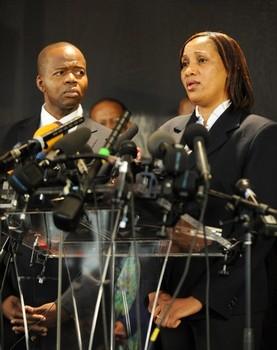View photo

0
988
DSK Accuser DIALLO Nafissatou Holds News Conference
“I’ve been asking God, Why?” Nafissatou Diallo said at the end of two minutes of halting, nerve-racked, soft-spoken-to-the-brink-of-inaudibility speech. “Why me?”
“I just want to thank everybody,” she said, and slipped offstage to vanish into the folds of a sprawling Brooklyn megachurch.
Ten weeks ago, working as a housekeeper at the Sofitel New York hotel, Ms. Diallo, 32, an immigrant from West Africa, had a fleeting encounter with Dominique Strauss-Kahn, then the head of the International Monetary Fund and a contender for the presidency of France.
On Thursday, more than 200 members of the news media signed into the Christian Cultural Center in East New York, Brooklyn, to see and hear her.
With satellite trucks beaming the event around the world, the church parking lot looked very much like the one outside the Los Angeles courthouse during the O. J. Simpson trial.
This was, after all, Ms. Diallo’s first public appearance, capping a week in which she allowed her identity to be revealed, first in a magazine and in a television interview, then in a walk into the prosecutor’s office on Wednesday that was captured by photographers who had been told she was coming.
Her appearance on Thursday amounted to more than a few minutes for Ms. Diallo to express her anguish. It was also a moment of high-stakes political theater, set in one of New York City’s largest black churches, summoning echoes of racially charged cases in recent city history.
It also suggested a delicate public recasting of Ms. Diallo by her lawyers. She was not just the anonymous accuser exposed as a frequent liar by prosecutors. She was also the trembling, hard-working single mother who had been violently assaulted by Mr. Strauss-Kahn — and, in the telling on Thursday, wronged by the Manhattan district attorney. From the stage, her supporters demanded that the district attorney, Cyrus R. Vance Jr., move ahead with the prosecution of Mr. Strauss-Kahn or give way to a special prosecutor.
Among those standing next to Ms. Diallo were politicians, academics and clergy members, including the pastor, the Rev. A. R. Bernard. He was asked if the gathering had been a way to send a message from a powerful church to a powerful prosecutor, Mr. Vance.
Mr. Bernard, known for reticence, not public belligerence, smiled slightly before answering.
“I think, and hope, that he’s intelligent enough to understand what has been implied here,” Mr. Bernard said.
Of the two central characters in the Strauss-Kahn case, only one — Ms. Diallo — has spoken in public. Mr. Strauss-Kahn has maintained his constitutionally protected silence.
While Ms. Diallo has been called to account for lies on her asylum application and questionable financial transactions, Mr. Strauss-Kahn has not had to explain how his semen ended up on Ms. Diallo’s clothing. His lawyers have suggested that any sexual encounter was consensual, a claim that Ms. Diallo’s lawyer, Kenneth P. Thompson, scoffed at on Thursday.
People involved in criminal cases are usually advised to avoid discussing them unless they are in court or in their lawyers’ offices. That is regarded as such sound advice that the legal community is aghast when it is conspicuously not followed. For the accused, the risk is that they could implicate themselves in casual conversation.
For witnesses, like Ms. Diallo, any variation in how they describe events can be highlighted by the defense as an inconsistency to gnaw at their credibility. Asked on Thursday why he had embarked on a public campaign with Ms. Diallo, Mr. Thompson said there appeared to be nothing to lose.
“Every day, we’ve been told the case is going to be dismissed,” he said. “She doesn’t have to wait to tell the truth at trial; she is telling the truth today.”
A former federal prosecutor, Mr. Thompson said he planned to file a civil lawsuit seeking monetary damages against Mr. Strauss-Kahn on Ms. Diallo’s behalf, saying Mr. Strauss-Kahn had to be held “accountable.” A successful criminal prosecution of Mr. Strauss-Kahn would be of immense help to Ms. Diallo in a civil case.
The use of political pressure against prosecutors has been a tactic in high-profile cases for decades. But it has not been used as frequently — or as openly — since the 1980s and ’90s, when the Rev. Al Sharpton and others regularly questioned the vigor of investigations and called for the appointment of special prosecutors in cases involving police shootings or those that might have had racial underpinnings.
Mr. Thompson requested a special prosecutor on July 5, but he has not repeated that demand. Questioning the prosecutors’ motives is not productive, he said.
In recent days, Mr. Vance has maintained his silence. Some of his advisers have noted that if a decision to pursue criminal charges could be warped by political pressure, then an influential person like Mr. Strauss-Kahn might never be indicted.
The New York Times
PUB
Photos From This Album
PUB
Author
KHADHORMEDIA
Le Top des Tops Médias, KHADHOR' MEDIA, C'est Trop Top !
Le Top des Tops Médias, KHADHOR' MEDIA, C'est Trop Top !
Facebook
Recommend
Photo info






